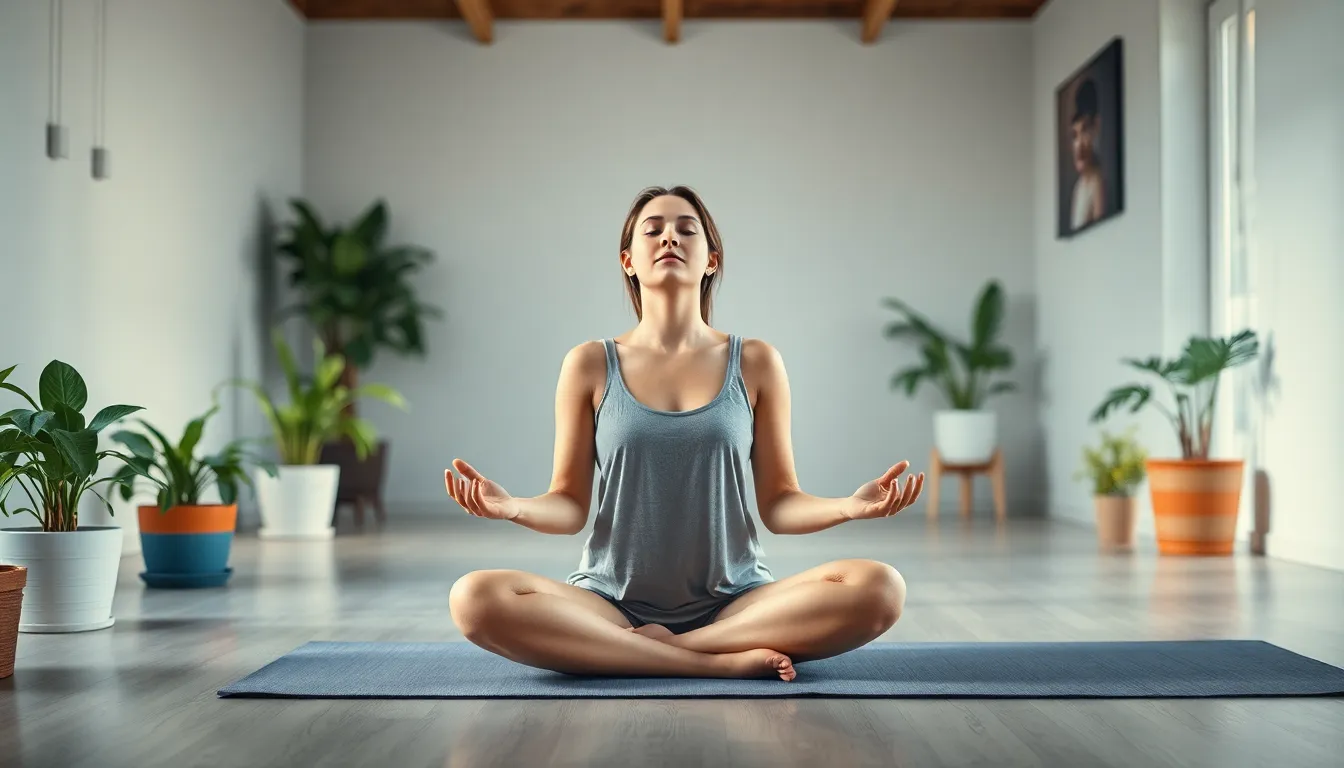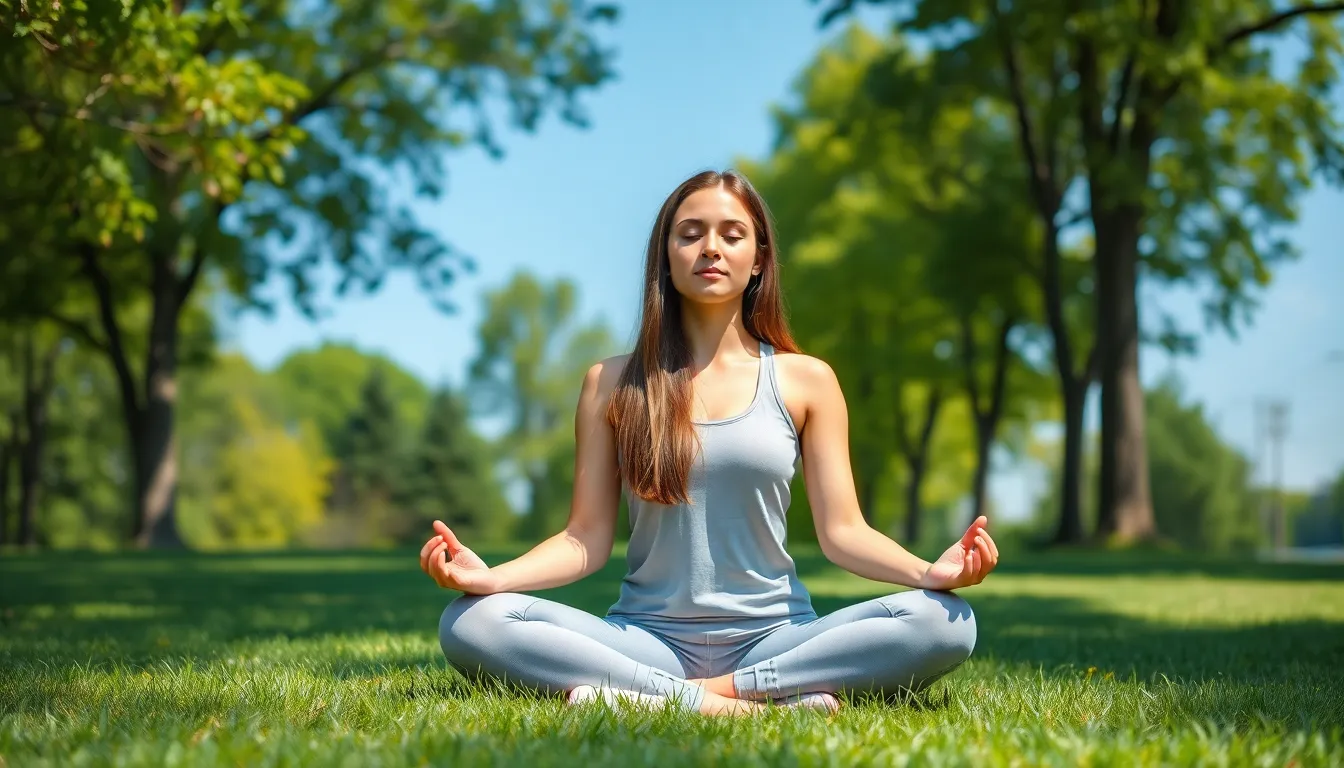In today’s fast-paced world, finding inner peace can feel like an elusive goal. Meditation techniques offer a pathway to calm the mind and enhance overall well-being. Whether one seeks stress relief, improved focus, or emotional balance, these practices provide valuable tools for navigating life’s challenges.
From mindfulness to transcendental meditation, each technique brings its own unique benefits and approaches. As more people turn to meditation for mental clarity and emotional resilience, understanding the various methods becomes essential. This article explores popular meditation techniques, guiding readers on their journey toward a more centered and fulfilling life.
Table of Contents
ToggleOverview of Meditation Techniques
Meditation techniques vary widely, offering different approaches to cultivating mindfulness and relaxation. Common methods include:
- Mindfulness Meditation: Focuses on being present in the moment. It encourages individuals to observe thoughts and feelings without judgment. This method enhances self-awareness and emotional regulation.
- Transcendental Meditation: Involves the silent repetition of a specific mantra. This technique allows practitioners to settle into a deep state of rest while promoting inner peace and reducing stress.
- Guided Visualization: Uses imagery and verbal cues from a guide or recording. This practice helps individuals to access their creativity and achieve relaxation by imagining peaceful scenes.
- Loving-Kindness Meditation: Cultivates compassion and love for oneself and others. Practitioners repeat phrases that express good wishes towards themselves and others, fostering a sense of connection.
- Body Scan Meditation: Involves paying attention to physical sensations in different body parts. This technique promotes relaxation and helps individuals identify areas of tension.
- Breath Awareness: Concentrates on the breath as a focal point. It encourages practitioners to notice inhalation and exhalation, which aids in calming the mind and improving focus.
Each technique offers unique benefits, enabling individuals to choose methods that resonate with their personal needs and lifestyles. Exploring various practices enables a deeper understanding of how meditation can enhance overall well-being.
Popular Meditation Techniques

Various meditation techniques exist, each offering unique benefits for physical, mental, and emotional well-being. Below are details on some of the most popular methods.
Mindfulness Meditation
Mindfulness Meditation centers on present-moment awareness. Practitioners focus on their thoughts, feelings, and bodily sensations without judgment. It enhances self-awareness and reduces stress by promoting a calm and attentive state of mind. Studies indicate that consistent practice improves emotional regulation and cognitive flexibility, leading to greater resilience in daily life.
Transcendental Meditation
Transcendental Meditation involves the use of a specific mantra, repeated silently, to promote deep relaxation and mental clarity. Practitioners typically engage in sessions lasting 15–20 minutes, twice a day. Research shows this technique can reduce anxiety and increase overall well-being by allowing the mind to settle into a profound state of rest.
Loving-Kindness Meditation
Loving-Kindness Meditation fosters compassion and empathy towards oneself and others. Practitioners repeat phrases that evoke wishes for health, happiness, and safety for themselves and loved ones. This technique has been shown to enhance emotional intelligence, reduce negative emotions, and improve relationships. Regular practice strengthens feelings of connectedness and promotes positive social interactions.
Benefits of Meditation Techniques
Meditation techniques offer numerous advantages that significantly enhance well-being across various dimensions. Below are key benefits associated with mental health and physical health improvements.
Mental Health Improvements
Meditation techniques contribute to significant mental health improvements. Techniques like Mindfulness Meditation enhance emotional regulation, reducing symptoms of anxiety and depression. Research shows that consistent practice lowers stress levels, fostering resilience against daily pressures. Transcendental Meditation creates a tranquil state of mind, leading to improved focus and cognitive clarity. Loving-Kindness Meditation promotes empathy, which deepens interpersonal relationships and boosts overall emotional intelligence.
| Mental Health Benefits | Details |
|---|---|
| Reduced Anxiety | Regular practice leads to decreased feelings of anxiety. |
| Enhanced Emotional Regulation | Improved ability to respond to emotional challenges. |
| Increased Focus | Techniques enhance attention span and concentration. |
| Greater Resilience | Builds capacity to cope with stress efficiently. |
Physical Health Benefits
Meditation techniques also provide physical health benefits. Evidence indicates that practices such as Guided Visualization can improve sleep quality, while Breath Awareness aids in lowering blood pressure. Body Scan Meditation helps individuals identify and release physical tension, promoting relaxation. Regular meditation has been linked to strengthened immune response and reduced inflammation, contributing to overall physical resilience.
| Physical Health Benefits | Details |
|---|---|
| Improved Sleep Quality | Lowers sleep-related issues and enhances restfulness. |
| Lowered Blood Pressure | Regular practice contributes to cardiovascular health. |
| Enhanced Immune Function | Strengthens body’s defenses against illness. |
| Reduced Physical Tension | Helps in recognizing and alleviating stress physically. |
How to Choose the Right Technique
Selecting a suitable meditation technique involves evaluating specific goals and personal inclinations. Understanding individual needs leads to a more effective practice.
Consider Your Goals
Identify clear objectives for meditation practice. Goals can range from reducing stress and anxiety to enhancing focus or fostering emotional resilience.
- Stress Reduction: Techniques like Guided Visualization and Breath Awareness effectively lower stress levels.
- Enhanced Focus: Mindfulness Meditation promotes sustained attention through present-moment awareness.
- Emotional Resilience: Loving-Kindness Meditation develops compassion, boosting emotional intelligence.
- Deep Relaxation: Transcendental Meditation utilizes mantra repetition for profound relaxation and mental clarity.
Defining specific goals aids in choosing a technique that aligns with personal aspirations.
Personal Preferences
Consider individual preferences when selecting a meditation practice. Different techniques resonate with various individuals based on lifestyle and comfort.
- Meditation Style: Some may prefer structured methods like Guided Visualization, while others lean toward open-ended practices like Mindfulness.
- Duration: Short sessions of Breath Awareness fit busy schedules, while longer practices like Transcendental Meditation require more time commitment.
- Environment: Preferences for quiet, serene spaces influence the choice between techniques like Body Scan Meditation versus more active methods.
- Guidance: Those favoring guided support might benefit from apps or sessions in Loving-Kindness Meditation or Guided Visualization.
Evaluating personal preferences allows for a more enjoyable and sustainable meditation experience.
Tips for Successful Meditation Practice
Successful meditation practice relies on intentional setup and regular engagement. Implementing these tips can enhance the meditation experience and foster deeper mindfulness.
Creating a Meditation Space
Creating a dedicated meditation space improves focus and reduces distractions. Choose a quiet area with minimal interruptions.
- Select comfortable seating: Use cushions, chairs, or mats that provide support.
- Incorporate calming elements: Add elements like plants, candles, or soft lighting to enhance tranquility.
- Minimize distractions: Keep the area free from noise and clutter. Silence electronic devices and limit visual stimuli.
- Personalize the space: Include items that inspire serenity and joy, such as meaningful artwork or spiritual symbols.
Establishing a Routine
Establishing a consistent meditation routine builds familiarity and commitment. Regular practice cultivates discipline and enhances mindfulness.
- Set a specific time: Designate time for meditation each day, whether in the morning, afternoon, or evening.
- Begin with short sessions: Start with five to ten minutes, gradually increasing the duration as comfort grows.
- Use reminders: Utilize alarms or calendar alerts to maintain consistency and encourage regular practice.
- Incorporate variety: Explore different techniques or styles during sessions to maintain interest and engagement.
Embracing meditation techniques can significantly transform one’s life by fostering inner peace and enhancing overall well-being. With various methods available each offering unique benefits individuals can tailor their practice to meet specific needs. Whether it’s cultivating compassion through Loving-Kindness Meditation or achieving mental clarity with Transcendental Meditation the potential for personal growth is immense.
By prioritizing regular practice and creating a conducive environment anyone can unlock the transformative power of meditation. This journey not only promotes stress relief and emotional balance but also encourages a deeper connection to oneself. As individuals explore these techniques they’ll likely discover a more centered and fulfilling approach to life.



